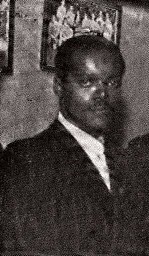Leônidas da Silva
 |
|||
| Personal information | |||
|---|---|---|---|
| Full name | Leônidas da Silva | ||
| Date of birth | 6 September 1913 | ||
| Place of birth | Rio de Janeiro, Brazil | ||
| Date of death | 24 January 2004 (aged 90) | ||
| Place of death | Cotia, São Paulo, Brazil | ||
| Playing position | Centre forward | ||
| Senior career* | |||
| Years | Team | Apps | (Gls) |
| 1929 | São Cristóvão | 29 | (31) |
| 1929–1930 | Sírio e Libanês | 47 | (50) |
| 1931–1932 | Bonsucesso | 51 | (55) |
| 1933 | Peñarol | 25 | (28) |
| 1934 | Vasco da Gama | 29 | (27) |
| 1935–1936 | Botafogo | 33 | (42) |
| 1936–1942 | Flamengo | 149 | (153) |
| 1943–1950 | São Paulo | 211 | (140) |
| Total | 574 | (516) | |
| National team‡ | |||
| 1932–1946 | Brazil | 19 | (21) |
| * Senior club appearances and goals counted for the domestic league only. ‡ National team caps and goals correct as of 16 June 2009 |
|||
Leônidas da Silva (Portuguese pronunciation: [leˈõnidɐz dɐ ˈsiwvɐ]; 6 September 1913, Rio de Janeiro – 24 January 2004, Cotia) was an association footballer and commentator, who played as a forward.
He is regarded as one of the most important players of the first half of the 20th century. Da Silva played for Brazil in two World Cups, and was the top scorer of the 1938 World Cup.
He was known as the "Black Diamond" and the "Rubber Man" due to his agility.
Leônidas, born in Rio de Janeiro, started his career at São Cristóvão. In 1931 and in 1932, he played for Bonsucesso.
He joined Peñarol in Uruguay in 1933. After one year, he came back to Brazil to play for Vasco da Gama. He helped them win the Rio State Championship. After playing in the World Cup in 1934 he joined Botafogo and won another Rio State Championship in 1935. The following year, he joined Flamengo, where he stayed until 1941. Once again, in 1939, the team won the Rio State Championship. He was also at the forefront of the movement against prejudice in football, being one of the first black players to join the then-elitist Flamengo team.
Leonidas joined São Paulo in 1942 and stayed at the club until his retirement from playing in 1950.
...
Wikipedia
